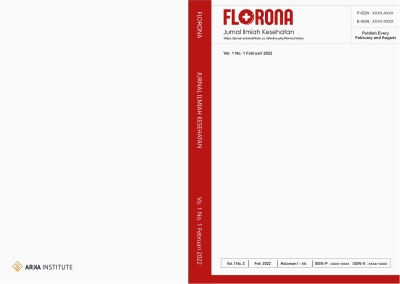Analisis faktor-faktor yang memengaruhi stigma terhadap pasien gangguan jiwa: Sistematic literature review
Main Article Content
Abstract
Kesehatan mental dipengaruhi oleh berbagai faktor seperti faktor biologis, psikologis, sosial, ekonomi, religius bahkan lingkungan sekitar. Selain itu, faktor demografi seperti usia, jenis kelamin, dan etnis menjadi faktor penentu yang memengaruhi paparan dari resiko tersebut. Literature review ini bertujuan untuk membahas stigma dan deskriminasi terhadap pasien gangguan jiwa. Penelusuran jurnal dilakukan identifikasi studi literature mengunakan database jurnal Internasional dan Nasional pencarian dilakukan melalui internet, tinjauan ulang artikel menggunakan PUBMED, Google Scholar, Semantic Scholar, Mendeley dan Science Direct. Pada database dilakukan pengaturan filter yang ada dilaman tersebut seperti fitur Full Text, Data Publish in 10 years ago, Human, dan filter Bahasa Indonesia dan Bahasa English. Berdasarkan hasil penelitian sepuluh (10) literature review dengan langkah-langkah strategis ini, menunjukkan bahwa stigma terhadap pasien gangguan jiwa dapat berkurang secara signifikan, sehingga mereka dapat menjalani kehidupan yang lebih bermartabat dan inklusif. Oleh sebab itu, disimpulkan bahwa stigma terhadap pasien gangguan jiwa adalah fenomena sosial yang kompleks, yang dapat memengaruhi kualitas hidup individu dan memengaruhi proses pemulihan mereka.
Article Details
Section

This work is licensed under a Creative Commons Attribution-NonCommercial 4.0 International License.
How to Cite
References
Ahmad, S. S., & Koncsol, S. W. (2022). Cultural Factors Influencing Mental Health Stigma: Perceptions of Mental Illness (POMI) in Pakistani Emerging Adults. Religions, 13(5), 401. https://doi.org/10.3390/rel13050401
Baminiwatta, A., Alahakoon, H., Herath, N. C., Kodithuwakku, K. M., & Nanayakkara, T. (2023). Trait Mindfulness, Compassion, and Stigma Towards Patients with Mental Illness: A Study Among Nurses in Sri Lanka. Mindfulness, 14(4), 979–991. https://doi.org/10.1007/s12671-023-02108-5
Budiman, A. T., & Utami, P. D. (2024). Mengurangi Stigma : Menjelaskan Gangguan Mental ’ Ringan ’ dan Dampaknya terhadap Kehidupan Sehari-hari. 2(01), 32–42.
Corrigan, P. W., Morris, S. B., Michaels, P. J., Rafacz, J. D., & Rüsch, N. (2012). Challenging the Public Stigma of Mental Illness: A Meta-Analysis of Outcome Studies. Psychiatric Services, 63(10), 963–973. https://doi.org/10.1176/appi.ps.201100529
Firmawati, Febriyona, R., & Rengkung, R. (2023). Stigma Masyarakat Terhadap Penderita Gangguan Jiwa Di Wilayah Kerja Puskesmas Limboto Barat. Jurnal Anestesi: Jurnal Ilmu Kesehatan Dan Kedokteran, 1(3), 1–12.
Ku, T. K., & Ha, M. (2015). Stigma of Mental Illness: Social Distancing Attitudes among Registered Nurses in Australia. Journal of Biosciences and Medicines, 03(12), 40–47. https://doi.org/10.4236/jbm.2015.312007
Maloney, R. S. (2022). Discrimination and Stigma of Mentally Ill Patients among Health Care Workers and the Public in Developing Countries; its Effect on the Integration of Mental Health Services into the Primary Health Care System- A Systematic Review. Texila International Journal of Public Health, 10(1), 366–381. https://doi.org/10.21522/TIJPH.2013.10.01.Art029
Nazira, D., Mawarpury, M., Afriani, A., & Kumala, I. D. (2022). Literasi kesehatan mental pada mahasiswa di banda aceh. Seurune: Jurnal Psikologi Unsyiah, 5(1), 23–39.
Pamungkas, D. R., Linawati, O. M., & Sutarjo, P. (2016). Stigma Terhadap Orang Dengan Gangguan Jiwa (ODGJ) Pada Mahasiswa Program Studi Ilmu Keperawatan Stikes jenderal Achmad Yani Yogyakarta. Media Ilmu Kesehatan, 5(2), 128–132.
Park, S., Kim, M.-J., Cho, M. J., & Lee, J.-Y. (2015). Factors affecting stigma toward suicide and depression: A Korean nationwide study. International Journal of Social Psychiatry, 61(8), 811–817. https://doi.org/10.1177/0020764015597015
Ran, M.-S., Hall, B. J., Su, T. T., Prawira, B., Breth-Petersen, M., Li, X.-H., & Zhang, T.-M. (2021). Stigma of mental illness and cultural factors in Pacific Rim region: a systematic review. BMC Psychiatry, 21(1), 8. https://doi.org/10.1186/s12888-020-02991-5
Román-Sánchez, D., Paramio-Cuevas, J. C., Paloma-Castro, O., Palazón-Fernández, J. L., Lepiani-Díaz, I., de la Fuente Rodríguez, J. M., & López-Millán, M. R. (2022). Empathy, Burnout, and Attitudes towards Mental Illness among Spanish Mental Health Nurses. International Journal of Environmental Research and Public Health, 19(2), 692. https://doi.org/10.3390/ijerph19020692
Saguem, B. N., Nakhli, J., Romdhane, I., & Nasr, S. B. (2022). Predictors of sleep quality in medical students during COVID-19 confinement. L’Encéphale, 48(1), 3–12. https://doi.org/10.1016/j.encep.2021.03.001
Sari, M. K., & Susmiatin, E. A. (2023). Deteksi Dini Kesehatan Mental Emosional pada Mahasiswa. Jurnal Ilmiah STIKES Yarsi Mataram, 13(1), 10–17. https://doi.org/10.57267/jisym.v13i1.226
Shafiq, F., Haider, S. I., & Ijaz, S. (2020). Anxiety, Depression, Stress, and Decision-Making Among Orphans and Non-Orphans in Pakistan. Psychology Research and Behavior Management, Volume 13, 313–318. https://doi.org/10.2147/PRBM.S245154
Turvey, C. L., Jogerst, G., Kim, M. Y., & Frolova, E. (2012). Cultural differences in depression-related stigma in late-life: a comparison between the USA, Russia, and South Korea. International Psychogeriatrics, 24(10), 1642–1647. https://doi.org/10.1017/S1041610212000816
WHO. (2018). Mental Health ATLAS 2017. World Health Organization.
Widiyanto, J., & Anisah, R. (2021). Stigma masyarakat tentang gangguan mental emosional. As-Shiha: Jurnal Kesehatan, 1(1), 1–7.
Yadav, V., & Kharwar, S. (2024). Association between Knowledge about Mental Health, Compassion towards Others and Attitude towards Mentally Ill Persons among Young Adults from Raebareli. International Journal of Indian Psychology, 12(4), 398–409. https://doi.org/10.25215/1204.038
Yang, L. H., Kleinman, A., Link, B. G., Phelan, J. C., Lee, S., & Good, B. (2007). Culture and stigma: Adding moral experience to stigma theory. Social Science & Medicine, 64(7), 1524–1535. https://doi.org/10.1016/j.socscimed.2006.11.013
Yu, B. C. L., Mak, W. W. S., Leung, I. W. Y., & Chio, F. H. N. (2021). Reducing Stigma Through Interconnectedness and Compassion: a Buddhism-Based Approach to Reduce Stigma Toward People with Mental Illness. Mindfulness, 12(7), 1779–1790. https://doi.org/10.1007/s12671-021-01640-6
Zanardi, R., Attanasio, F., Manfredi, E., & Colombo, C. (2021). Aggressiveness in bipolar illness: From stigma to reality. Psychopathol. Forensic Setting, 27, 64–70. https://doi.org/10.36148/2284-0249-422
Zeng, Y., Pan, T., He, Y., & Sun, M. (2024). Stigma of nursing students towards people with mental illness: Protocol of a mixed‐method systematic review. Heliyon, 10(6), e27899. https://doi.org/10.1016/j.heliyon.2024.e27899
Zhang, Z., Sun, K., Jatchavala, C., Koh, J., Chia, Y., Bose, J., Li, Z., Tan, W., Wang, S., Chu, W., Wang, J., Tran, B., & Ho, R. (2019). Overview of Stigma against Psychiatric Illnesses and Advancements of Anti-Stigma Activities in Six Asian Societies. International Journal of Environmental Research and Public Health, 17(1), 280. https://doi.org/10.3390/ijerph17010280

